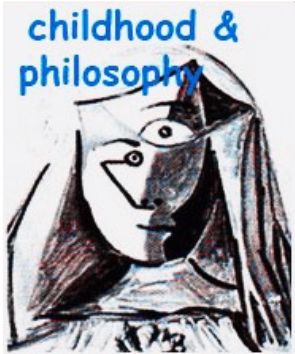educating selves in a tech addicted age.
DOI:
https://doi.org/10.12957/childphilo.2022.67647Keywords:
education and self-development, increasing dimensionality, dialogue and self-development, technology addiction.Abstract
In this paper we argue that, if it is true that maximum self-development is better both for individuals and society, and if it is true that that self-development is being seriously curtailed by pervasive environmental tech forces, then clearly educational systems, since they are guardians of “developing” young humans, have a moral imperative to push back against forces that diminish the self. On the other hand, if it is not true that “more self is always better,” that perhaps “goodness of fit” between self and society is optimum, then education systems are justified in continuing to pay scant attention to the forces of self-development (or lack thereof). In line with Sherry Turkle’s (2011) argument that tech forces are diminishing the sort of reflective reasoning necessary for self-development, we will argue that since communicative interchange is necessary for self-development, and an ever-developing self is necessary for ever deeper and more meaningful dialogue (hence forming a dialectic), the fact that social media and other forms of tech connection stunts deep and meaningful interchange has serious implications. Specifically, we will argue that, in contemporary high-tech society (what we are calling Society 2.0), the dialectic between self and communication is going the “wrong” way; that genuine dialogue is becoming ever more rare, which in turn is resulting in “diminished-I’s,” which in turn is resulting in ever more complacency in the face of utterly superficial communicative interchange. We will begin with an overview of what we mean by a “diminished-I,” and then follow by noting how social media, the reading vacuum, roboticism, crowd communication, and decreasing social capital are resulting in diminished-I’s. Since this is resulting in an “I-diminished” society, we will reflect on the question of whether those dialogical educational initiatives that promote self-development are, in fact, making dodos, i.e., making youngsters unfit for the environment in which they find themselves. Ultimately, we will argue that, if educators choose to fight back against the I-diminishing forces of Society 2.0, they need to take selves seriously and actively engage youngsters in dialogue with those with opposing viewpoints. Ultimately, youngsters in Society 2.0 will need all the assistance educators can muster to fight the addictive, literally mind-numbing forces of being “happily” “alone together,” and instead chose the riskier often unhappy-making option of diving into the truth-seeking process with varying coalitions of the willing.
Downloads
References
Adorno, Theodore. (1966). Education After Auschwitz. https://josswinn.org/wp-content/uploads/2014/12/AdornoEducation.pdf
Bernays, Edward. (2005). Propaganda. New York: Brooklyn.
Buber, Martin. (1958). I and Thou. 2nd ed. New York: Charles Scribner’s Sons.
Connell, Ryann. (2004). Rent-A-Doll Blows Hooker Market Wide Open. Mainichi Daily News, December 16. Available at: http://mdn.mainichi.co.jp/waiwai/0412/1216dool.html.
Dewey, John. (2007). Democracy and Education. Teddington, Eng.: Echo Library.
Dostoyevsky, Fyodor. (1912). The Brothers Karamazov. Trans. Constance Garnett. New York: Macmillan.
Dostoyevsky, Fyodor. (2001). The Grand Inquisitor. Existential Literature: An Introduction. Linda E. Patrik (ed). Belmont, CA: Wadsworth.
Frankfurt, Harry. (1971). Freedom of the Will and the Concept of a Person. The Journal of Philosophy. 68.1: 5–20. https://doi.org/10.2307/2024717
Frankl, Viktor E. (1985). Man’s Search for Meaning. New York: Pocket Books.
Gallup, Gordon G. (1977). Self-Recognition in Primates: A Comparative Approach to the Bidirectional Properties of Consciousness. American Psychologist, May, vol. 32, pp. 329-338.
Gardner, S. T. (1981). A Person's Concept of Person: A Developmental Model of Self. PhD thesis, Concordia University. Retrieved on December 12, 2021. Available at https://spectrum.library.concordia.ca/id/eprint/4607/1/NK49614.pdf
Gardner, Susan T. (1998). Philosophy for Children really works! A Report on a Two-Year Empirical Study. Critical and Creative Thinking. 6-1. pp. 1-11.
Gardner, Susan T. (2011). Taking Selves Seriously. Cultural Politics and Identity. Eds. B. Weber, H Karfriedrich, E. Marsal, T. Dobashi, P Schweitzer. Berlin: Lit Verlag, pp. 79-89.
Ginsberg, Herbert and Sylvia Opper. (1969). Piaget’s Theory of Intellectual Development: An Introduction. Inglewood Cliffs: Prentice Hall.
Huxley, Aldous. (1998). Brave New World. New York: Perennial Classics.
Lipman, M. (1991). Thinking in Education. New York. Cambridge University Press.
Le Bon, Gustave. (1894/2002). The Crowd: A Study of the Popular Mind. New York: Dover.
Levy, David. (2007). Love and Sex with Robots. New York: HarperCollins.
Oaklander, L. Nathan (ed.). (1996). Existential Philosophy: An Introduction. 2nd ed. Ed. L. Nathan Oaklander. Upper Saddle River, New Jersey: Prentice Hall.
Marcuse, Herbert. (1969). One-Dimensional Man. Boston: Beacon Press.
Maslow, A. H. (1943). "A theory of human motivation". Psychological Review. 50 (4): 370–96.
Mead. George H. (1934). On Social Psychology. Strauss, A. (ed.). Chicago: University of Chicago Press.
Mill, John Stuart. (1962). Utilitarianism and Other Writings. New York: New American Library.
Patrik, Linda E. (2001). Existential Literature: An Introduction. Belmont, CA: Wadsworth.
Peters, Tom. (2007). The Brand Called You. Fast Company, 31 Aug.
Available at http:// fastcompany.com/magazine/10/brandyou.html.
Piaget, J. (1969). The Mental Development of the Child, in J. Piaget, Six Psychological Studies. New York: Random House.
Putnam, Robert D. (2000). Bowling Alone: The Collapse and Revival of American Community. Simon & Schuster.
Riesman David, Nathan Glazer, and Reuel Denney. (1950). The Lonely Crowd. New Haven: Yale University Press.
Rogers, Kristen. (2019). US teens use screens more than seven hours a day on average -- and that's not including schoolwork. CNN, October 29. Available at https://www.cnn.com/2019/10/29/health/common-sense-kids-media-use-report-wellness/index.html
Turkle, Sherry. (2011). Alone Together: Why We Expect More from Technology and Less From Each Other. New York: Basic Books.
Wolf, Maryanne. (2018). Reader, Come Hone: The reading Brain in a Digital World. New York: Harper.



